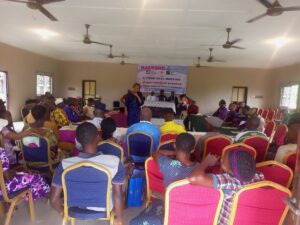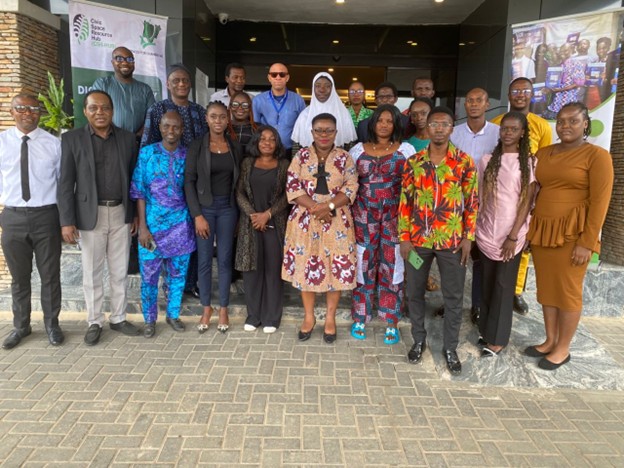What will be the fate of oil-rich communities when fossil fuels are phased away? This was the main thrust of the April 20 townhall in Ntak Inyang Community, Esit Eket Local Government Area (LGA) in Akwa Ibom State, organized by Spaces for Change | S4C, in partnership with the Network Advancement Program for Poverty and Disaster Risk Reduction (NAPPDRR) and the Natural Resources Governance Institute (NRGI). The townhall’s 72 participants comprised key stakeholders, including the Ntak Inyang village head and his executive members, women and youth leaders, representatives from civil society, media, and government agencies like Akwa-Ibom State Ministry of Environment, Nigerian Upstream and Regulatory Commission (NUPRC), Akwa-Ibom State Ministry of Women Affairs and Social Development and Akwa-Ibom State Ministry of Works.
Shortly after Nigeria’s President Muhammadu Buhari announced the country’s commitment to reach net zero by 2060 during the COP26, the Nigerian government launched the Energy Transition Plan (ETP) in August 2022 which chronicles the national action plans for cutting carbon emissions and gradually phasing out the use of fossil fuel. The ETP is however, silent on the fate and roles of oil-rich communities in the Niger Delta region of Nigeria famed for their huge oil and gas deposits that have borne the brunt of oil mineral extractive activities which sustained the economy for several decades. Ntak Inyang Community is a host community of OML 13 and 14 Stubbs Creek Marginal Field Operations with Universal Energy Resources LTD and Savannah Energy Company. The community suffers from massive environmental damage and land devastation associated with oil exploration activities, leaving indigenous communities impoverished and stripped of their traditional livelihoods.
Fossil fuels emit gaseous substances that are heavy in carbon which cause climate change. All over the world, tsunamis, flooding, earthquakes, and other impacts of climate change have been well-documented, provoking new debates and conversations on how to reduce carbon emissions. During the meeting, civil society leaders, energy experts, and environmental activists shed light on the ideological underpinnings and rationale for the global clamor for a transition to a low-carbon economy and the phasing out of fossil fuels like crude oil. Through detailed presentation of research findings such as S4C’s research publication, “Energy Transition in Nigeria’s Oil-Rich Communities”, they enlightened oil-rich communities about the contents of the national energy transition plans (ETP), the benefits of a green economy and the opportunities for local participation.
As with many communities where S4C has conducted outreach, members of Ntak Inyang community confessed that they were hearing about energy transition and the ETP for the first time. At the end of the meeting, they had a better understanding of terms like climate change, ozone layer, global warming, greenhouse gas, green economy, and other concepts directly relating to them as extractive communities.
Aligning with the national energy transition agenda does not mean legitimate community fears and concerns should be sacrificed or overlooked at the altar of environmental redemption from the impacts of climate change. That energy transition must be just, fair, and inclusive cannot be overemphasized. Insisting on clean-ups, land remediation, and compensation, community members indicated a preference for a transition where there will be full environmental accountability from governments and corporations. Community women and youth also demanded inclusion in the relevant training and acquisition of new technological skills that will enable them to play meanignful roles in the green economy.




